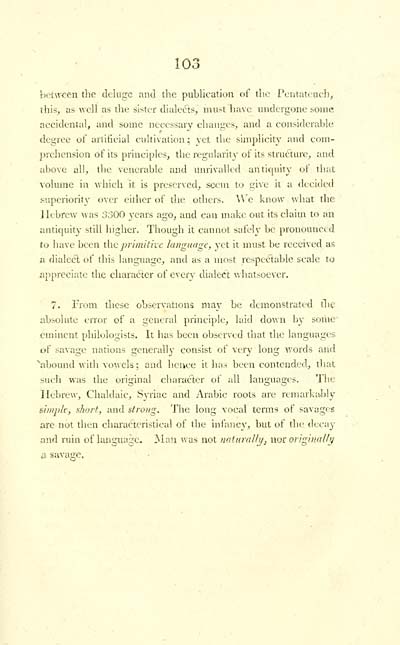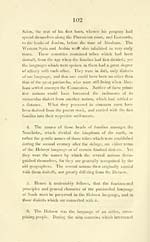Blair Collection > Celtic researches, on the origin, traditions & language, of the ancient Britons
(193)
Download files
Complete book:
Individual page:
Thumbnail gallery: Grid view | List view

103
belwcen the deluge and the publication oi" tlic Pcntatcucii,
this, as well as the sister dialects, must have undergone some
accidental, and some necessary changes, and a considerable
degree of artiíìeial cultivation; yet the simplicity and com-
prehension of its principles, the regularity ot" its structure, and
above all, the venerable aiul unrivalled antiipiity of that
volume in which it is preserved, seem to give it a decided
superiority over either ot" the odiers. W'e know what the
Hebrew ^\ as 3300 years ago, and can make out its claim to an
antiquity still higher. Though it cannot safely be pronounced
to have been the p}-imitivc language, yet it must be received as
ii dialect of this language, and as a most respectable scale to
iipprceiate the character of every dialect v, hatsoevcr.
7. From these observations may be demonstraii-d tlic
absolute error of a general principle, laiti doAvn by some"
eminent philologists. It has been observed that the languages
of savage nations generally consist of very long words and
\ibound with vowels; and hence it has been contended, that
such was the original character of all languages. The
Hebrew, Chaldaic, Syriae and Arabic roots are remarkably
s'lmpk, short, and strong. The long vocal terms of savages
are not then characteristical of the inlancy, but of the decay
and ruin of language. Man was not uatiirnili/, \\οΐ originalhj
a savage.
belwcen the deluge and the publication oi" tlic Pcntatcucii,
this, as well as the sister dialects, must have undergone some
accidental, and some necessary changes, and a considerable
degree of artiíìeial cultivation; yet the simplicity and com-
prehension of its principles, the regularity ot" its structure, and
above all, the venerable aiul unrivalled antiipiity of that
volume in which it is preserved, seem to give it a decided
superiority over either ot" the odiers. W'e know what the
Hebrew ^\ as 3300 years ago, and can make out its claim to an
antiquity still higher. Though it cannot safely be pronounced
to have been the p}-imitivc language, yet it must be received as
ii dialect of this language, and as a most respectable scale to
iipprceiate the character of every dialect v, hatsoevcr.
7. From these observations may be demonstraii-d tlic
absolute error of a general principle, laiti doAvn by some"
eminent philologists. It has been observed that the languages
of savage nations generally consist of very long words and
\ibound with vowels; and hence it has been contended, that
such was the original character of all languages. The
Hebrew, Chaldaic, Syriae and Arabic roots are remarkably
s'lmpk, short, and strong. The long vocal terms of savages
are not then characteristical of the inlancy, but of the decay
and ruin of language. Man was not uatiirnili/, \\οΐ originalhj
a savage.
Set display mode to: Large image | Transcription
Images and transcriptions on this page, including medium image downloads, may be used under the Creative Commons Attribution 4.0 International Licence unless otherwise stated. ![]()
| Early Gaelic Book Collections > Blair Collection > Celtic researches, on the origin, traditions & language, of the ancient Britons > (193) |
|---|
| Permanent URL | https://digital.nls.uk/75766004 |
|---|
| Description | A selection of books from a collection of more than 500 titles, mostly on religious and literary topics. Also includes some material dealing with other Celtic languages and societies. Collection created towards the end of the 19th century by Lady Evelyn Stewart Murray. |
|---|
| Description | Selected items from five 'Special and Named Printed Collections'. Includes books in Gaelic and other Celtic languages, works about the Gaels, their languages, literature, culture and history. |
|---|

